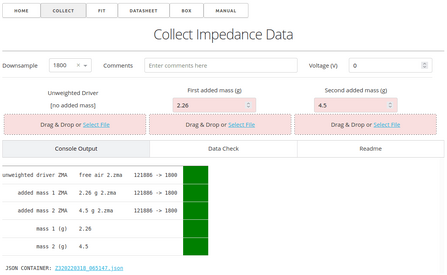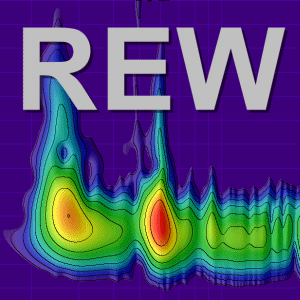There are no error messages. Only the technical data file at the time of the error from firefox. Three files. Free air, 2.26g, 4.5g.the three files M0, M1 and M2
-
AUDIO VIDEO PROCESSING, SETUP & ENVIRONMENTOfficial REW (Room EQ Wizard) Support Forum Audiolense User Forum Calibration Equipment Auto-EQ Platforms / Immersive Audio Codecs Video Display Technologies / Calibration AV System Setup and Support Listening Room / Home Theater Build Projects Room Acoustics and Treatments AV Showcase Movies / Music / TV / Streaming
-
AUDIO VIDEO DISCUSSION / EQUIPMENTHome Theater / Audio and Video - Misc Topics Essence For Hi Res Audio AV Equipment Advice and Pricing Awesome Deals and Budget AV Equipment AV Receivers / Processors / Amps UHD / Blu-ray / CD Players / Streaming Devices Two Channel Hi-Fi Equipment DIY Audio Projects Computer Systems - HTPC / Gaming HD and UHD Flat Screen Displays Projectors and Projection Screens AV Accessories Buy - Sell - Trade
Navigation
Install the app
How to install the app on iOS
Follow along with the video below to see how to install our site as a web app on your home screen.
Note: This feature may not be available in some browsers.
More options
You are using an out of date browser. It may not display this or other websites correctly.
You should upgrade or use an alternative browser.
You should upgrade or use an alternative browser.
Thiele-Small Parameters measurement using dual added mass method.
- Thread starter Bernard
- Start date
Here are the results in the attached zip file.There are no error messages. Only the technical data file at the time of the error from firefox. Three files. Free air, 2.26g, 4.5g.
Attachments
John Mulcahy,
found that after measuring the impedance, the component model is calculated differently for different cases. If the model only includes a resistor and an inductance, in my case, the REW shows an inductance of 2.011 mkH. If there are more elements in the model, the inductance is 188 or 185 mkH. The real one should be a little more than 200 mkH. That is, 2.011 mkH should probably be multiplied by 100.
found that after measuring the impedance, the component model is calculated differently for different cases. If the model only includes a resistor and an inductance, in my case, the REW shows an inductance of 2.011 mkH. If there are more elements in the model, the inductance is 188 or 185 mkH. The real one should be a little more than 200 mkH. That is, 2.011 mkH should probably be multiplied by 100.
Attachments
Last edited:
John Mulcahy
REW Author
- Joined
- Apr 3, 2017
- Posts
- 9,147
The component model is for inductors or capacitors, not drive units. For drive units there is a much more complex model, that is the point of the TS parameter analysis.
Based on my measurements in post #54, REW calculated a Qts of 1,196. The manufacturer gives 0.78. Bl REW 2.726, the manufacturer gives 3.04. Can such a large discrepancy between these parameters be caused by different conditions before measurements? The manufacturer pre-applied a 20W stepped sine wave for 20 hours, and I didn't.
@sm52
I'm sorry you're having instability issues with Speakerbench. As John noted, Speakerbench doesn't require javascript. We use the Dash/Plotly framework to serve the apps via your browser, so it should work on your phone, tablet or PC without any special libraries or apps. One thing I can suggest is (carefully!) clearing your browser history and trying again. If you still have issues I'll do my best to troubleshoot.
I'm sorry you're having instability issues with Speakerbench. As John noted, Speakerbench doesn't require javascript. We use the Dash/Plotly framework to serve the apps via your browser, so it should work on your phone, tablet or PC without any special libraries or apps. One thing I can suggest is (carefully!) clearing your browser history and trying again. If you still have issues I'll do my best to troubleshoot.
maybe a log is being created on my laptop when the browser crashes? I could find it and show it.I'll do my best to troubleshoot.
jcandy
I did smoothing 1/24, 96 PPO. The number of lines as and before. This time I got it. But. In this case, the error Sorry. Then I got everything without smoothing. In this case, the Fair error. That is, smoothing reduces accuracy and increases error.
What I noticed. Previously, I entered the values of two weights, then loaded the zma files. This time I loaded the zma files, then entered 2 weights. Loading now and before is fine. The browser thinks for half a minute, a json file appears. But when you hover over it, there is no way to get a download link. At the same time, the processor is overloaded, it considers something, it overheats. The reason is overheating during incomprehensible calculations. This time I did nothing, I waited for about three minutes. The link appeared, the json file downloaded in half a second. Further, when you click on the FIT tab, the browser hangs for 1-2 minutes. then everything works.
Now a question. Why need to download the json file to computer and then upload it to your site? If your site made a json file, let it move it to the FIT tab. Without download or upload.
I did smoothing 1/24, 96 PPO. The number of lines as and before. This time I got it. But. In this case, the error Sorry. Then I got everything without smoothing. In this case, the Fair error. That is, smoothing reduces accuracy and increases error.
What I noticed. Previously, I entered the values of two weights, then loaded the zma files. This time I loaded the zma files, then entered 2 weights. Loading now and before is fine. The browser thinks for half a minute, a json file appears. But when you hover over it, there is no way to get a download link. At the same time, the processor is overloaded, it considers something, it overheats. The reason is overheating during incomprehensible calculations. This time I did nothing, I waited for about three minutes. The link appeared, the json file downloaded in half a second. Further, when you click on the FIT tab, the browser hangs for 1-2 minutes. then everything works.
Now a question. Why need to download the json file to computer and then upload it to your site? If your site made a json file, let it move it to the FIT tab. Without download or upload.
@sm52 I don't know that there's much we can do to make this process easier or less painful for such large ZMA files. The dataset is considerably reduced in size before the fit, so one possibility would be for us to add the option to apply the data reduction before offering the Z-file for download. If I see other users regularly using large ZMA files I might consider this. But as I mentioned before, keep in mind that your ZMA file is about 100X larger than it needs to be.
About your question regarding carrying the Z-file forward automatically to the fit: the web programming framework makes this more complicated than you might imagine. To do so I would need to define a new internal browser memory space and make it shared across callbacks. We had initially thought to do this, but discovered that forcing the user to download the Z-file enforces a useful workflow such that one is left with a data record after fitting session is complete.
About your question regarding carrying the Z-file forward automatically to the fit: the web programming framework makes this more complicated than you might imagine. To do so I would need to define a new internal browser memory space and make it shared across callbacks. We had initially thought to do this, but discovered that forcing the user to download the Z-file enforces a useful workflow such that one is left with a data record after fitting session is complete.
Hello Jeff, sm52,
The other day I uploaded sm52's files, Speakerbench worked properly, and I posted the results.
My pc is running Windows 11 Pro, version 21H2, build 22000.527. MS Edge is my browser and I also use NordVPN when I want to watch F1 for free on RTS, the French speaking Swiss TV. ;-)
Upload worked fine with and without VPN.
Yesterday, I installed the latest Firefox 64 bits version and I redid the test with sm52's files.
Everything worked fine until I wanted to download the Json file.
The screen froze and even with Alt+Ctrl+Del I couldn't stop the Firefox program.
I had to shut down the pc wildly by holding down the power button.
When I rebooted, I uninstalled Firefox and returned to Edge as my default browser.
I didn't try to figure out why Firefox was freezing.
The other day I uploaded sm52's files, Speakerbench worked properly, and I posted the results.
My pc is running Windows 11 Pro, version 21H2, build 22000.527. MS Edge is my browser and I also use NordVPN when I want to watch F1 for free on RTS, the French speaking Swiss TV. ;-)
Upload worked fine with and without VPN.
Yesterday, I installed the latest Firefox 64 bits version and I redid the test with sm52's files.
Everything worked fine until I wanted to download the Json file.
The screen froze and even with Alt+Ctrl+Del I couldn't stop the Firefox program.
I had to shut down the pc wildly by holding down the power button.
When I rebooted, I uninstalled Firefox and returned to Edge as my default browser.
I didn't try to figure out why Firefox was freezing.
Last edited:
jcandy
about the size of the zma file. Yes, he's big. But notepad opens it quickly. So it's not a problem.
I have 8 GB of RAM. When firefox hangs, 36-38% is busy. Before working with REW and Speakerbench, 18% is occupied. So the lack of memory is not a problem for me.
I think that when trying to generate a json file and then load it, there is some kind of unexpected loop that is erroneous.
about the size of the zma file. Yes, he's big. But notepad opens it quickly. So it's not a problem.
I have 8 GB of RAM. When firefox hangs, 36-38% is busy. Before working with REW and Speakerbench, 18% is occupied. So the lack of memory is not a problem for me.
I think that when trying to generate a json file and then load it, there is some kind of unexpected loop that is erroneous.
@sm52
I added a downsample option that will reduce the size of the Z-file significantly and make the download less painful. The upload will still be slow but hopefully this will work better for you since the real killer was trying to serve such a large JSON file for download. Let me know if that helps.
Thanks for your feedback!
I added a downsample option that will reduce the size of the Z-file significantly and make the download less painful. The upload will still be slow but hopefully this will work better for you since the real killer was trying to serve such a large JSON file for download. Let me know if that helps.
Thanks for your feedback!
Attachments
Hi Bernard,
Thanks alot for your help here.
This is good to know. I appreciate the feedback. IMO the uploads with these files are slow but should complete on most systems. Claus and I have tested on Windows, Linus and OSX and see slowness but never a crash. However ...
I think the killer is the large JSON file (the Z-file) that the browser serves for download. This causes awful slowdown on all my computers and makes the browser sluggish even after closing the tab. As you can see in my post to sm52, the downsample option makes the JSON file smaller and hopefully makes the issue less severe.
Thanks alot for your help here.
Bernard said:The other day I uploaded sm52's files, Speakerbench worked properly, and I posted the results.
My pc is running Windows 11 Pro, version 21H2, build 22000.527. MS Edge is my browser and I also use NordVPN when I want to watch F1 for free on RTS, the French speaking Swiss TV. ;-)
Upload worked fine with and without VPN.
This is good to know. I appreciate the feedback. IMO the uploads with these files are slow but should complete on most systems. Claus and I have tested on Windows, Linus and OSX and see slowness but never a crash. However ...
Bernard said:Yesterday, I installed the latest Firefox 64 bits version and I redid the test with sm52's files. Everything worked fine until I wanted to download the Json file. The screen froze and even with Alt+Ctrl+Del I couldn't stop the Firefox program. I had to shut down the pc wildly by holding down the power button. When I rebooted, I uninstalled Firefox and returned to Edge as my default browser. I didn't try to figure out why Firefox was freezing.
I think the killer is the large JSON file (the Z-file) that the browser serves for download. This causes awful slowdown on all my computers and makes the browser sluggish even after closing the tab. As you can see in my post to sm52, the downsample option makes the JSON file smaller and hopefully makes the issue less severe.
Hello Jeff,
Any difference during uploads and between the non-activated downsample :
Fit quality : GOOD Zero-mass error : 0.18 Full-mass error : 0.29 Electrical error : 0.50 Error (fail > 1) : 0.49 Datafile (JSON) : ADV20220318_132951.json
and the activated downsample :
Fit quality : GOOD Zero-mass error : 0.18 Full-mass error : 0.29 Electrical error : 0.50 Error (fail > 1) : 0.49 Datafile (JSON) : ADV20220318_133314.json
Problem related to the machine used?
I just got one problem at the very beginning of Speakerbench with too large files.
Cheers,
Bernard
Any difference during uploads and between the non-activated downsample :
Fit quality : GOOD Zero-mass error : 0.18 Full-mass error : 0.29 Electrical error : 0.50 Error (fail > 1) : 0.49 Datafile (JSON) : ADV20220318_132951.json
and the activated downsample :
Fit quality : GOOD Zero-mass error : 0.18 Full-mass error : 0.29 Electrical error : 0.50 Error (fail > 1) : 0.49 Datafile (JSON) : ADV20220318_133314.json
Problem related to the machine used?
I just got one problem at the very beginning of Speakerbench with too large files.
Cheers,
Bernard
I used metal washers for fasteners of different sizes as weights. Today I checked how they react to approaching the speaker membrane. A speaker with a membrane diameter of 8.7 sm at a distance of 3 sm begins to attract a puck suspended on a thread. Then she sticks to the membrane. This means that washers are not suitable for measuring Thiel-Small parameters. As well as any weights interacting with a magnet. Non-magnetic weights must be used.
I used metal washers for fasteners of different sizes as weights. Today I checked how they react to approaching the speaker membrane. A speaker with a membrane diameter of 8.7 sm at a distance of 3 sm begins to attract a puck suspended on a thread. Then she sticks to the membrane. This means that washers are not suitable for measuring Thiel-Small parameters. As well as any weights interacting with a magnet. Non-magnetic weights must be used.
Yes, that is correct. Non-magnetic weights only should be used. We have added some text in the manual to reflect this (see attached photo).
Attachments
How to understand what is the cause of a large electrical error? The mechanical error is small, and the electrical error is large:
(wfit): Mechanical error [%] = 0.065
(wfit): Electrical error [%] = 0.581 0.678
Those particular numbers are not normalized and have only a relative meaning. For a better normalized electrical error you should use the electrical error at the top of the results, not the lower gray area.
The electrical error at the top is about the same as at the bottom, my question is how to understand it? I take several measurements, do not change anything in the wires and devices, the electrical error was small, about 0.2, and suddenly it becomes about 0.6-0.7. And I changed only the weight of the weights.you should use the electrical error at the top of the results
This is one. Secondly, your site works fine once, the second time too, and the third time you visit, it does not display the 'Downsample' window. I click 'refresh', the 'Downsample' window appears, the text in the file download windows disappears. I press refresh again, everything changes in a circle. One will disappear, then another. Further. I have uploaded the measurements. All rectangles are green, the json file has appeared. I want to see 'Data Check'. I click, one time there is information, another time it is not. Same with the tabs in the 'Fit' window.
John Mulcahy
I measured the driver impedances in free air and in a box. REW calculated the TS parameters. I entered the volume of the box 10l. Vas turned out to be 10.7 liters. It seemed strange to me. Then I entered the volume of the box 20l. REW calculated Vas 21l. That is, with any volume of the box, Vas will turn out a little more. For measuring TS parameters with the added volume method, is this correct?
I measured the driver impedances in free air and in a box. REW calculated the TS parameters. I entered the volume of the box 10l. Vas turned out to be 10.7 liters. It seemed strange to me. Then I entered the volume of the box 20l. REW calculated Vas 21l. That is, with any volume of the box, Vas will turn out a little more. For measuring TS parameters with the added volume method, is this correct?
John Mulcahy
REW Author
- Joined
- Apr 3, 2017
- Posts
- 9,147
VAS is proportional to the sealed box volume used in the measurement, but it also depends on the peak frequency from the sealed box measurement. If you measure in a larger box you will get a different peak frequency and end up with the same VAS (within the bounds of experimental error).
I understand. Thank you. When measured by the method of additional volume, Vas turned out to be 10.7 liters. And when measured by the method of dual added mass 13.4l.
1. When there is a driver with unknown TS parameters from the manufacturer, how can you be sure that you get the correct measurements?
2. Is the dual added mass method actually more accurate than the added volume method? Indeed, in real conditions, no mass is ever glued to the driver diffuser.
1. When there is a driver with unknown TS parameters from the manufacturer, how can you be sure that you get the correct measurements?
2. Is the dual added mass method actually more accurate than the added volume method? Indeed, in real conditions, no mass is ever glued to the driver diffuser.
Popular tags
20th century fox
4k blu-ray
4k uhd
4k ultrahd
action
adventure
animated
animation
bass
blu-ray
calibration
comedy
comics
denon
dirac
dirac live
disney
dolby atmos
drama
fantasy
hdmi 2.1
home theater
horror
kaleidescape
klipsch
lionsgate
marantz
movies
onkyo
paramount
pioneer
rew
romance
sci-fi
scream factory
shout factory
sony
stormaudio
subwoofer
svs
terror
thriller
uhd
ultrahd
ultrahd 4k
universal
value electronics
warner
warner brothers
well go usa















